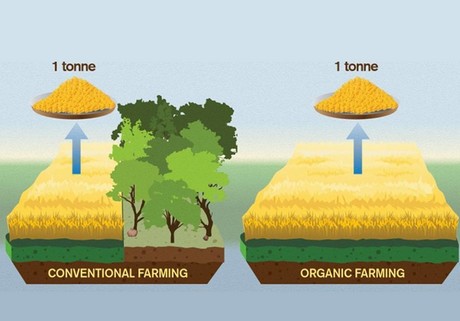One of the main aims of organic farming is to maximise the 'natural' aspects and minimise chemical interference when it comes to producing our food. But is it actually better for the environment?
A new study, published in Nature, looked at pea and wheat crops and it suggests the opposite. It claims that organic farms are worse for the climate, simply because they tend to take up more room. That means more deforestation, and less carbon getting pulled out of the air and stored in the ground, conclude the international team of researchers.
But to be clear, this research was limited to a couple of crops in just one region, so it's way too soon to make any broad sweeping statements about the entire industry. For their study, the team of scientists focused on the farming of organic peas and wheat in Sweden.
Primarily because no fertilisers are used, organic pea farming takes up more space than non-organic pea farming, and that can be a problem, depending on how that land would otherwise get used.

"Our study shows that organic peas, farmed in Sweden, have around a 50 percent bigger climate impact than conventionally farmed peas," says one of the researchers, Stefan Wirsenius from Chalmers University of Technology. "For some foodstuffs, there is an even bigger difference – for example, with organic Swedish winter wheat the difference is closer to 70 percent."
The team developed a "carbon opportunity cost" metric for assessing the carbon footprint of certain types of land use, charting carbon dioxide emissions against how much food is produced. For organic farms, that ratio lags behind non-organic farms. Few previous studies have considered how carbon storage in vegetation and soil affects the environmental impact of organic farming, according to the researchers.
And the team isn't suggesting organic farming should be shut down at the earliest opportunity – rather that its use should be carefully considered. That consideration could extend to biofuels too, which also need more land to produce than conventional fuels.
According to sciencealert.com, the issue is particularly topical in Sweden, with the government pushing for an expansion in organic farming. These policy decisions have an impact on the climate across the globe, the researchers point out.